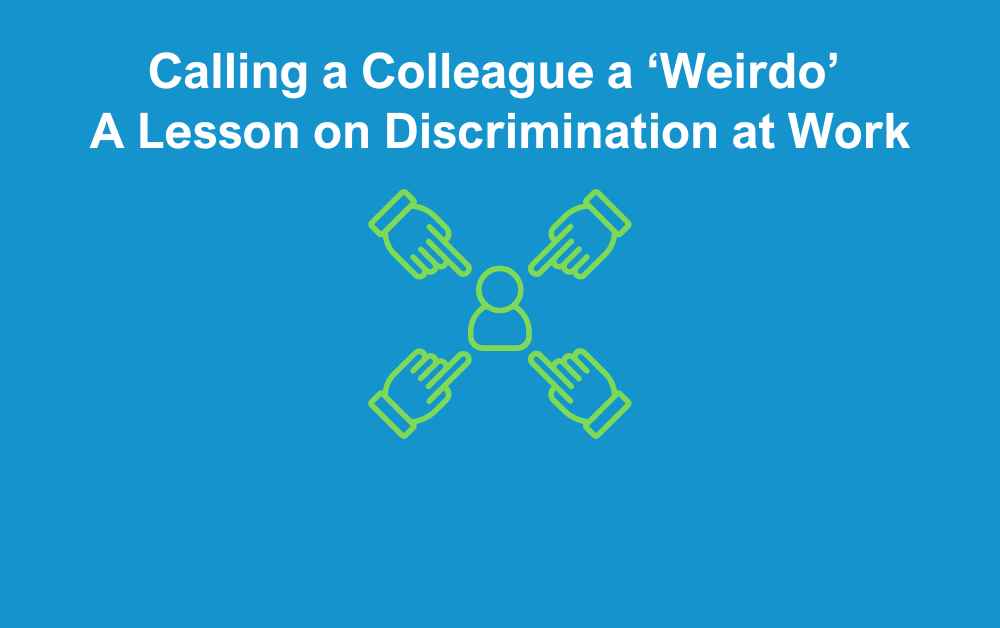A recent employment tribunal has shed new light on what might constitute discrimination at work, even when it involves seemingly casual comments. In a case involving an employee with autism, a colleague’s use of the word weirdo was found to amount to disability-related harassment. The tribunal ruled in favour of the employee, emphasising that even throwaway remarks can create a hostile working environment when they relate to a protected characteristic.
This ruling serves as an important reminder for employers to consider how workplace culture, language, and attitudes can impact employees. It is also a clear reminder of how failing to act appropriately can lead to legal action.
Employment Tribunal Case Summary
An Employment Tribunal recently ruled that calling an autistic employee a weirdo during a work meeting was seen as discrimination at work. This was seen as disrespecting his dignity and contributed to ongoing unfair treatment linked to his disability. Mr James had worked at the community-based organisation in Wrexham since 2021. He worked as a project worker on an inclusion initiative that supported children with neurodivergent conditions, such as autism.
Mr James worked with children and occasionally supported public events where music was played. He told the tribunal that background music affected his focus and asked for adjustments. While music was paused during his direct work, it continued during events, leaving him feeling that his needs were overlooked. He said he felt dismissed, accused of spoiling children’s fun, and unable to do his job effectively.
The Cardiff tribunal ruled in his favour on disability discrimination and harassment, awarding £17,154.86 in compensation. This included £15,000 for injury to feelings. While other claims were dismissed, the tribunal found that the senior manager’s comments, given Mr James’s autism diagnosis, breached the Equality Act by failing to respect his dignity and needs.
Legal Perspective: What Counts as Discrimination at Work?
Under the Equality Act 2010, employers have a legal duty to protect staff from discrimination related to protected characteristics, such as disability. This includes not only direct discrimination but also harassment—behaviour that creates a hostile, degrading, or offensive environment.
In this case, the tribunal found that calling the employee a ‘weirdo’ was more than just a flippant comment. Because the term related to his autism diagnosis, it amounted to disability-related discrimination. Importantly, it didn’t matter whether the colleague intended to cause harm; the impact on the individual, and the link to his condition, was what mattered.
This ruling reinforces that informal communication, whether in person or over email, can still fall under the scope of workplace discrimination law. Employers should be aware that failure to take such matters seriously can result in successful tribunal claims. This is even when the behaviour appears minor on the surface.
Lessons for Employers
Employers must be alert to how workplace environments and practices may unintentionally disadvantage employees with disabilities.
In this instance, the issue wasn’t a deliberate act of exclusion. It was a failure to make reasonable adjustments – something that is a legal obligation under the Equality Act 2010. Employers must take requests for adjustments seriously and assess whether current practices, such as playing background music during public sessions, could place certain employees at a disadvantage.
Another important takeaway is the need for managers and colleagues to understand the impact of language and behaviour on neurodivergent employees. Even casual remarks can be deeply harmful and perceived as dismissive or exclusionary.
Employers should ensure that:
-
Reasonable adjustments are considered and implemented without unnecessary delay
-
Managers receive training on supporting neurodivergent staff
-
There is a clear process for raising and responding to concerns
-
Inclusion is not just a project objective, but a cultural value embedded in day-to-day decisions
By proactively fostering a respectful and inclusive environment, organisations can reduce the risk of claims related to discrimination at work and support all employees to thrive.
How to Prevent Similar Issues
Preventing discrimination at work requires a proactive and inclusive approach from employers. While policies are important, it’s often day-to-day practices and communication that make the biggest difference. Here are some practical steps organisations can take:
-
Review your workplace environment – Consider how sensory factors like noise, lighting, or room layout might affect neurodivergent staff, and be prepared to adapt where possible.
-
Make reasonable adjustments a priority – Have a clear, supportive process for employees to request changes that help them work comfortably and effectively.
-
Train your team – Equip managers and staff with an understanding of neurodiversity and how unconscious bias or thoughtless comments can amount to discrimination. Our team deliver management training programmes on inclusion and diversity to hundreds of organisations. You can find out more about what’s involved and prices on our website.
-
Encourage open dialogue – Create a culture where employees feel safe raising concerns, and where their needs are acknowledged and respected.
-
Monitor and review inclusion efforts – Regularly check that inclusion initiatives are not just box-ticking exercises, but genuinely reflect employee experience.
By embedding these practices into your organisation, you not only reduce legal risk but build a more supportive and productive workplace.
Conclusion
This tribunal decision is a clear signal that seemingly minor workplace issues can have a significant impact. This is particularly when they involve employees with disabilities. Discrimination at work isn’t always obvious or intentional, but the consequences are very real for those affected.
Employers must take reasonable adjustments seriously. You must act on concerns, and ensure the workplace culture is inclusive by design, not just intention. By fostering a respectful environment and listening to employees’ individual needs, businesses can create safer, fairer workplaces for everyone.
If you’re unsure about your responsibilities or how best to support your team, we are here to help. Our HR experts can support you with practical guidance, policy reviews, and training tailored to your organisation. Contact us today.







